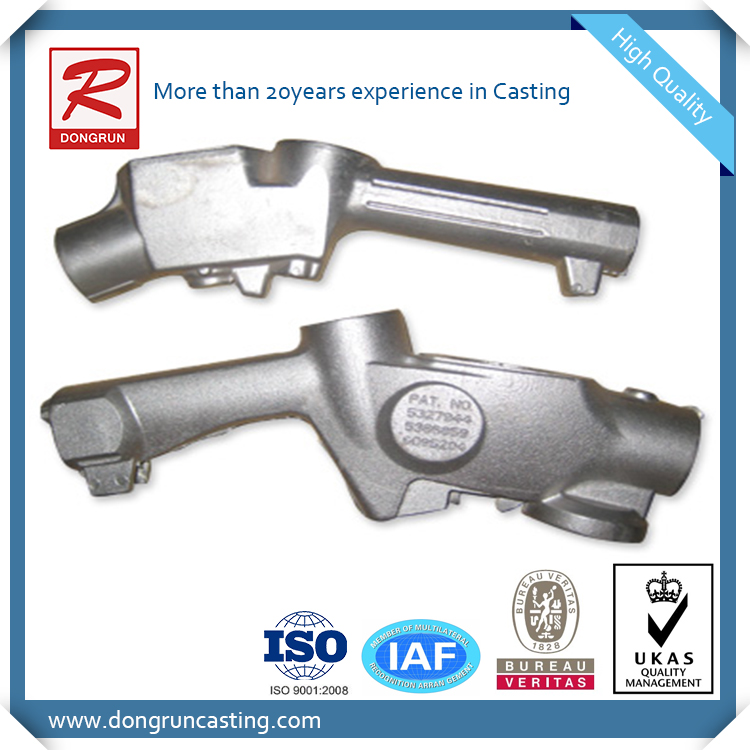High-quality Aluminum Cast for Fuel Nozzle Body Housing

In the ever-evolving automotive industry, precision and durability are paramount, especially in components that directly affect engine performance and efficiency. Among these components, the fuel nozzle body housing stands out as a critical element of high-pressure fuel injection systems. To meet the demanding requirements of modern engines, high-quality aluminum casting has become the material of choice for manufacturing fuel nozzle body housings.
Design and Functionality of the Fuel Nozzle Body Housing
A high-pressure fuel injection system is designed to deliver fuel with exceptional precision and consistency. At the heart of this system lies the nozzle housing, a sophisticated component that encloses a nozzle needle capable of axial displacement. The nozzle needle operates within the housing to regulate the opening and closing of an outflow aperture in the valve seat, controlling the fuel spray pattern and flow rate.
A unique feature of advanced nozzle housings is the incorporation of a pulsation reducer. Positioned between the nozzle needle and the inner surface of the housing, this component mitigates pressure pulsations in the fuel as it flows through the injection nozzle. The pulsation reducer typically comprises multiple breakwater elements, designed to dampen oscillations and enhance the stability of fuel delivery, ensuring optimal combustion efficiency.
Manufacturing Process of Aluminum Cast Fuel Nozzle Housings
The production of aluminum cast fuel nozzle housings involves several advanced techniques to ensure precision and reliability:
Mold Design and Preparation: Custom molds are designed to achieve the complex geometries required for nozzle housings. These molds are often made of high-grade steel or sand-based materials for durability and precision.
Melting and Alloying: High-quality aluminum alloys, such as A356 or 319, are melted in controlled environments to ensure uniformity and the desired mechanical properties. Alloying elements like silicon and magnesium are added to enhance strength and corrosion resistance.
Casting Techniques: Methods such as die casting, sand casting, or investment casting are employed, depending on the specific requirements of the housing. These techniques ensure tight tolerances and minimal defects.
Heat Treatment: Post-casting heat treatment, such as T6 tempering, is applied to improve mechanical properties, such as tensile strength and ductility.
Machining and Finishing: Precision machining processes refine the housing’s dimensions and ensure compatibility with other system components. Surface treatments like anodizing or powder coating may be applied for added protection and durability.
Advantages of Aluminum Casting in Nozzle Body Housing
Aluminum casting has become the preferred manufacturing method for fuel nozzle body housings due to its exceptional combination of properties:
Lightweight Design: Aluminum's low density reduces the overall weight of the fuel injection system, contributing to improved vehicle fuel efficiency.
High Strength-to-Weight Ratio: Despite its light weight, aluminum offers excellent mechanical strength, ensuring the durability and longevity of the nozzle housing under high-pressure conditions.
Corrosion Resistance: Aluminum’s natural resistance to corrosion enhances the durability of the housing, even in harsh operating environments.
Thermal Conductivity: Superior heat dissipation properties help to regulate temperatures within the fuel injection system, preventing overheating and ensuring consistent performance.
Manufacturing Precision: Advanced casting techniques allow for the production of intricate geometries required for nozzle housings, ensuring tight tolerances and seamless integration with other system components.
The Role of Breakwater Elements in Pulsation Reduction
Fuel injection systems are susceptible to pressure fluctuations that can compromise performance. The pulsation reducer, with its array of breakwater elements, plays a vital role in mitigating these fluctuations. These elements are strategically positioned within the nozzle housing to:
Dampen Pressure Waves: By breaking up fuel flow turbulence, the elements stabilize pressure, ensuring consistent injection rates.
Enhance Combustion Efficiency: Smooth and steady fuel delivery promotes complete combustion, reducing emissions and improving engine performance.
Prolong System Lifespan: Reduced pulsations decrease wear on critical components, enhancing the overall durability of the injection system.
Quality Control Measures in Manufacturing
Ensuring the reliability of aluminum-cast fuel nozzle housings requires rigorous quality control measures:
Material Testing: Aluminum alloys are tested for composition, strength, and resistance properties to ensure compliance with industry standards.
Dimensional Inspection: Advanced tools like coordinate measuring machines (CMMs) verify that the housing dimensions meet specified tolerances.
Non-Destructive Testing (NDT): Techniques such as X-ray inspection and ultrasonic testing are used to detect internal defects or porosity in the castings.
Functional Testing: Assembled nozzle housings undergo performance tests to simulate operating conditions and validate their reliability and efficiency.
Conclusion
High-quality aluminum casting has revolutionized the production of fuel nozzle body housings, offering unparalleled performance benefits. By combining lightweight design, superior strength, and advanced functionality such as pulsation reduction, aluminum-cast nozzle housings ensure that modern engines meet stringent efficiency and emission standards. This innovative approach not only enhances engine performance but also paves the way for a more sustainable and efficient automotive future.
Dongrun Casting has 20000 square meters of facility houses and 200 production & test equipment, From quotation and tooling design to casting and finished machining, we can work with you at every stage. We serve a wide range of industries-from Fortune 500 corporations to small and midsize OEMs. Our products include Automotive&trucking, Electric Utility & Communications, Metering Systems, the Hydraulic Industry, Medical Devices, Lighting, Fuel and Gas Pressure, and Furniture parts.
More Details: www.dongruncasting.com
